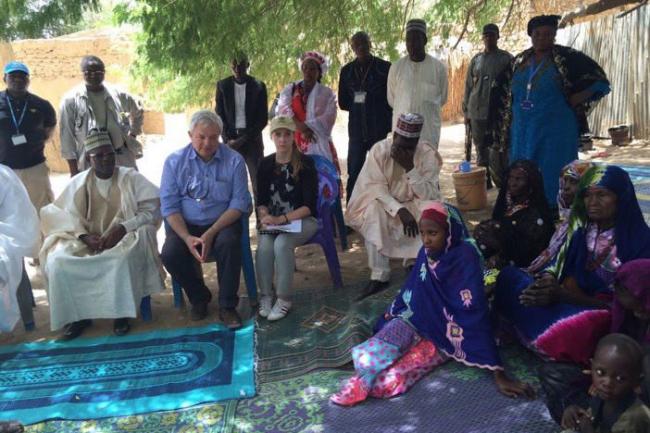
In Niger, UN relief chief urges focus on civilians impacted by Boko Haram violence
“I am appalled by reports of killing of civilians, looting of villages, and other abuses perpetrated by Boko Haram in the countries around the Lake Chad Basin, including Niger,” Stephen O'Brien, Under-Secretary-General for Humanitarian Affairs, said in a press release.
“Adherence to international humanitarian law and norms is fundamental in conflict and it applies to all parties, without exception,” he said.
In the Diffa region, O'Brien visited the Assaga site, which hosts more than 15,000 people, including refugees, returnees and internally displaced people who had been recently forced out of their homes due to Boko Haram attacks. Two out of three people in the region have experienced displacement.
“This morning I met a family in Diffa hosting 30 people who had fled violence caused by Boko Haram both in Nigeria and in Niger. As the first to respond, the solidarity and generosity of families in Diffa who have shared their scarce resources with those in need are an example and inspiration to us all,” noted O'Brien, who is also the UN Emergency Relief Coordinator.
He also met with the President of Niger, Mahamadou Issoufou; Prime Minister Brigi Rafini; Minister of the Interior, Mohamed Bazoum; Niger's first Minister for Humanitarian Affairs, Laouan Magagi; and several other senior Government officials.
O'Brien said they discussed ways to step up the humanitarian response for people affected by Boko Haram, as well as the challenges that Nigerians continue to face despite the Government's commitment to build people's resilience to recurrent food insecurity and malnutrition crises.
In 2016, humanitarian partners and the Nigerien Government plan to assist two million food insecure people and 1.5 million people threatened by malnutrition, including 1.2 million children.
“Displacement or malnutrition alone causes great human suffering. A combination of the two is too much for people to bear. Together, we must help them now with urgent supplies and services,” O'Brien stressed.
The humanitarian community has launched a Humanitarian Response Plan for 2016 targeting 1.5 million people with a budget requirement of $316 million. So far, only 25 per cent has been received, which is “clearly insufficient” to meet the immediate needs, the Under-Secretary-General said.
O'Brien will travel from the Lake Chad Basin region to Istanbul to participate in the first-ever World Humanitarian Summit being held on 23 and 24 May.
“The Summit will be a critical opportunity for me to tell the stories of the people I met, who have been affected by the Boko Haram violence,” he said.
“An event on the Lake Chad Basin region will help us draw global attention to the increasing vulnerability of the communities of the region, who are facing the converging events of climate change, high poverty levels, violent extremism and population growth,” he added.
O'Brien noted that a comprehensive approach is urgently needed to ensure greater collaboration between the political, security, development, environmental and humanitarian efforts to maximize scarce resources and to ensure no one is left behind. “A big, compounded crisis needs a big, compounded response,” he concluded.
In related news, the Under-Secretary-General, speaking via phone to reporters at the daily press briefing at UN Headquarters in New York, reiterated that he had specifically decided to visit the Lake Chad Basin region ahead of the World Humanitarian Summit to bring attention to the “chronic and endemic” life conditions for millions of people as a result of the six-year “brutal campaign” by Boko Haram.
He noted that it was clear from the stories of the people he had met that the humanitarian effects have been escalating, notwithstanding some security progress, and that it was “absolutely vital” to see a “very sharp example of everything that will come together” at the Summit.
“That's why we have deliberately come here, to recommit and get the political will that will propel us to deliver to those most in need,” he said.
The emphasized that the Summit will help to ensure that all humanitarian actors work in a way “that can give confidence to everyone across the whole of the humanitarian ecosystem,” not just in meeting immediate needs also in helping people's lives to thrive and not be left in vulnerability.
Asked his reaction to reports earlier on Wednesday that one of the more than 250 schoolgirls who were kidnapped more than two years ago from Chibok, Nigeria, had been found, O'Brien said that there was “at last a sense of confidence of a first step that things can be better.”
Noting that the international community was both focused on and very concerned by the reports, the Under-Secretary-General stressed that it is vital to continue every effort to find all of those who have been abducted.
Photo: UN OCHA
Source: www.justearthnews.com
Support Our Journalism
We cannot do without you.. your contribution supports unbiased journalism
IBNS is not driven by any ism- not wokeism, not racism, not skewed secularism, not hyper right-wing or left liberal ideals, nor by any hardline religious beliefs or hyper nationalism. We want to serve you good old objective news, as they are. We do not judge or preach. We let people decide for themselves. We only try to present factual and well-sourced news.







